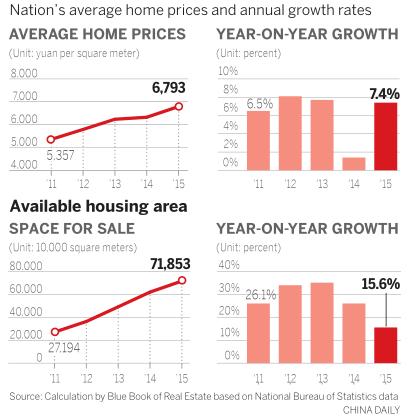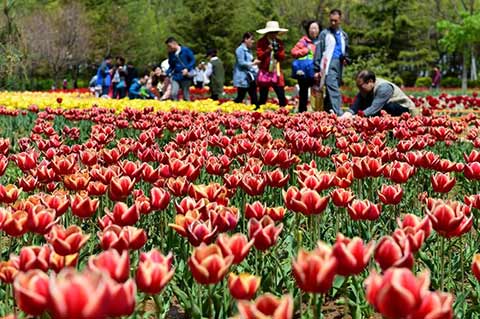Home prices 'likely to rise this year, but may fall next'
By WANG YIQING (China Daily) Updated: 2016-05-06 02:38
 |
Home prices in first- and second-tier cities will probably rise this year because of relaxed regulatory policies, but if the overall economic situation continues to sour, this may put downward pressure on the real estate market, according to the Blue Book of Real Estate 2016, released on Thursday.
If the country's economic growth continues to decline, home prices will probably start to fall across the board from the second half of 2017, said economists from the Chinese Academy of Social Sciences who compiled the book.
Authors of the CASS book estimate that the real estate market is set to recover this year as the favorable policies continue. Eased macroeconomic policies may further release speculative demand and raise demand for housing, which will result in increases in housing sales and home prices in general.
Additionally, the sales recovery of commercial housing in first- and second-tier cities may provide incentives for real estate developers to increase investments.
However, "since 2014, the country's real estate investment growth rate has continued to decline", said Wang Yeqiang, a researcher at the Institute for Urban and Environmental Studies at the CASS.
"In 2015, the growth rate of real estate investment had hit a record low of 1 percent," said Wang, a co-author of the book. "China's real estate investment has started to enter a long-term downward cycle."
If the macroeconomic situation worsens, which is quite probable, the risks of China's real estate market will increase, the report said.
"Sharp rises of home prices in some key cities from the end of 2015 and the beginning of 2016 may only be a short-term uptick," said Wang.
"Considering both the possible macroeconomic downturn in the longer term and the trend of a tightened policy stance, we draw the conclusion that we may see an overall decline in home prices starting from the second half of 2017," Wang said.
To achieve a healthy development of the real estate sector, the authorities need to clamp down on speculation, analysts said.
"Regulators need to encourage normal consumption and cool down speculative deals," said Ye Jianping, economist of Renmin University of China in Beijing. "Taxation policies, for example, can be used to that end, but administrative measures should be avoided".
- Kunming to hold expo and fair focused on South Asia
- JD.com to tap foreign wine brands to feed local e-buyers' tastes
- Tianlai Karaoke tests water in smart devices
- MIIT issues telecom license to China Broadcasting Network
- China's investment boosts Peru's GDP: Peruvian PM
- China Eastern to increase flights into Queensland state
- Supply-side reform to boost civil aviation, rental housing
- Apple feels the pinch in China as local brands leap forward

















